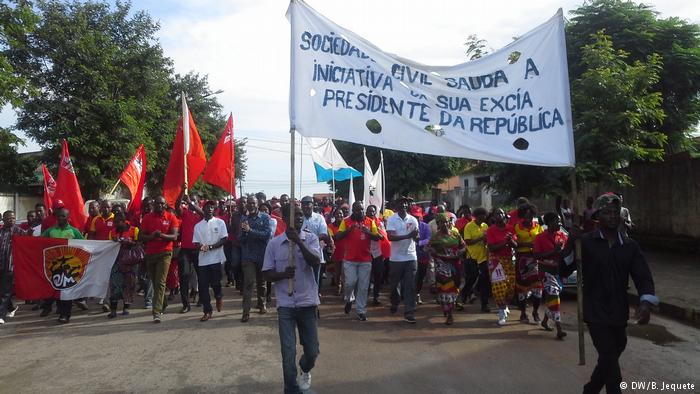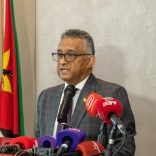Mozambique: Chapo appoints new head of State Security and Intelligence Service
Hundreds of people marched in support of Nyusi in Manica

DW / Demonstrators demanded a return to peace on the streets of Chimoio
Members of civil society organisations and the ruling party took to the streets of Chimoio to support the consensus over decentralisation reached between Frelimo and Renamo.
Hundreds of people took to the streets of Manica provincial capital Chimoio on Saturday in support of President Filipe Nyusi and the decentralisation consensus reached with the leader of the Mozambican National Resistance (Renamo), Afonso Dhlakama.
Demonstrators marched through the streets and avenues of the provincial capital, singing, handing out signs, posters, leaflets, and wearing T-shirts with the message: “We want peace”. The march was convened by civil society organisations and was attended by members of the Liberation Front of Mozambique (Frelimo), the ruling party.
Soares Juga Ferro, president of the District Youth Council in Chimoio (CDJ), said that the young population decided to go to the streets to pressure Renamo into adhering to the peace process and demobilising its armed wing. For Soares, effective peace would increase investment in the country and therefore job opportunities for young people.

“The future of Mozambique is in the hands of young people and they want to see the return to peace, which is a great catapult for the development of a prosperous country with youth at the forefront. [Filipe Nyusi] went to the forests of Gorongosa to meet the Renamo leader in search of the consensus that we are witnessing today, which is why we are joining together and are ready to move forward,” Ferro said.
The first secretary of the Frelimo Provincial Committee in Manica, Ana Armando Chapo, said that the event welcomed the silencing of weapons in the face of recent hostilities that the country had witnessed, in that province in particular. “This march is a salutation to the efforts that President Nyusi has been making for peace,” she said.
The governor of Manica province, Alberto Ricardo Mondlane, stressed the importance of the presence of civil society. “Good things should be celebrated, and one of the good things for the Mozambican people is peace. Without peace, we cannot do anything – we already have experience of that,” the governor said.
Amendment to the Mozambican constitution is an “accommodation of the will of two persons” – academic
Decentralisation
The agreement between Frelimo and Renamo announced last week by Filipe Nyusi, provides for provincial governors and district administrators to be nominated by those who win the elections for their respective assemblies instead of being appointed by the centre. The proposal to revise the Constitution that was deposited in the Assembly of the Republic for consideration also establishes that the municipal presidents no longer be directly elected but be appointed by municipal assemblies.
In an interview with Lusa, Mozambican philosopher Severino Ngoenha criticised the agreement. “This agreement is structurally weak because it addresses only the dynamics of the two parties and ignores the popular will,” he said. For Ngoenha taking away the direct vote in mayoral elections indicates that politics is in flight from the real problems of the people. “The proposed decentralisation has centralised power. The political party will be the new monarch,” he said.
The Mozambican government justifies the change as a way of simplifying the electoral process, and making it the same for all levels of administration, with the membership of an assembly indicating who is to lead it.
With regard to military affairs, the Mozambican president stressed that consensus on the disarmament, demobilisation and reintegration of Renamo personnel was being reached.













Leave a Reply
Be the First to Comment!
You must be logged in to post a comment.
You must be logged in to post a comment.